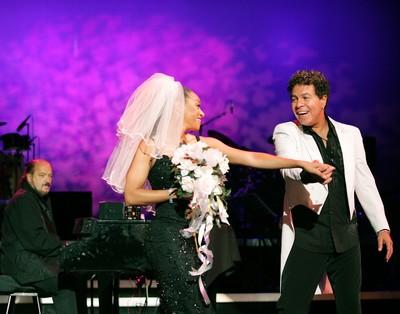Taking It All In Stride

It took a lot of rewriting for Clint Holmes’ autobiographical musical to keep up with recent changes in his life.
The popular showman already had committed to a stage project with veteran acting coach Larry Moss when, just before Christmas in 2004, he found out he had colon cancer.
The cancer was caught early and the 61-year-old singer is back to his bundle-of-energy self. Still, he says, "There was a moment of, ‘Oh my God, I could die.’ "
As he recovered from the ordeal, Holmes wrote a song called, "If Not Now, When." Taking its lyrics to heart, he decided that he wouldn’t fight the decision at Harrah’s Las Vegas to pull the plug on his headliner production after more than six years.
He told his manager to clear the decks, creating time to take a shot at Broadway or London’s West End rather than trying to move the casino act immediately to another showroom.
The cancer episode didn’t just motivate the musical; it became part of the musical. So did Holmes’ subsequent divorce after more than 30 years of marriage, along with characters based on both his ex-wife and current girlfriend (with all names changed to allow the freedom of creative license).
"Larry has this thing where he says, ‘The play asks for what it wants,’ " Holmes says. "As you write it, as you act it, it constantly asks for what it wants. It just changed and changed and changed."
The finished product, for this stage anyway, is called "Just Another Man," and will be performed today through June 24 in the Judy Bayley Theatre on the University of Nevada, Las Vegas campus. Performances through Wednesday are designated as previews.
The musical, which also uses the acronym "J.A.M." for short, is presented through the university’s theater training program, Nevada Conservatory Theatre. The goal is to test and refine the effort in front of local audiences before attempting the more costly, higher-pressure Broadway or London run. Holmes and his longtime musical director, Bill Fayne, are surrounded by a dream team of local professionals who may continue on with the musical.
Earl Turner, a fellow former Harrah’s Entertainment lounge and showroom star, plays Holmes’ father. Tina Walsh, the first star of "Mamma Mia!" at Mandalay Bay, plays his mother, while Reva Rice, who starred in "Starlight Express" at the Las Vegas Hilton and currently is part of "Monty Python’s Spamalot," plays a character based on Holmes’ ex-wife, Brenda. Holmes sister, Gayle Steele, becomes a pivotal character playing herself.
"There is greatness in Vegas," says Moss, whose acting studio in Los Angeles has coached Hilary Swank and Helen Hunt in breakthrough movie roles. "I’m not a director for hire. I only do what I love."
But when he saw Holmes’ show at Harrah’s for the first of what he figures to be 200 times, Moss was reminded of when he was a youthful witness to nightclub shows by legends such as Sammy Davis Jr. and Lena Horne. "He’s the last of that (tradition). I grabbed him and said, ‘Why aren’t you on Broadway? You’re a great artist.’ "
The two set out to create a performance vehicle that would somehow delve into the psyche of a nightclub performer and the vanishing showroom tradition.
Before they were too far along, Holmes’ cancer episode provided dark inspiration. "It gave us the seed of the show," Moss said. "It really made the whole show clear to us."
The musical begins with Holmes’ doing his familiar nightclub act before it’s interrupted by nurses who inform him — and the audience — that he is being wheeled into surgery. The rest of the action takes place under anesthesia, on the nightclub stage of his mind.
"J.A.M." isn’t the first time the entertainer has attempted to spin his unusual life story into a viable theatrical project. "Comfortable Shoes" was produced in New Jersey in 1996 with Holmes in the lead, and in Chicago in 2002 with another actor playing his character.
That musical, with different songs, dealt primarily with race and the question of where the singer fit as the product of a biracial marriage. The story of his father, a black G.I., who met his mother, a white British opera singer, during World War II, also figures into "J.A.M." But this time, it’s just one piece of the puzzle.
"What we really set out to do is tell a fuller, deeper story," Holmes says. "It’s like anything else, you raise the stakes. And the highest stakes you can raise is death."
The family history is now woven into the question of why entertainers are compelled to do what they do, and how they can "hide in the spotlight" to escape their troubles at home. Holmes’ harsh father haunts his relationship to his own son (played by Tezz Yancey), and the fact that he’s too busy traveling to be there for him.
"We’re not sugarcoating anything," Holmes says. "Everybody has in their life things they’re not quite proud of and things they are proud of. I think that’s OK as long as we keep learning. The great musicals are about finding redemption and the continuation of life."
"It’s dark. It’s not a musical comedy," Moss says. "When you see an artist at a certain age, you want to see the guts of them. You don’t come to see a happy show, you come to see the truth."
As the title found its path, Holmes (as lyricist) and Fayne (as primary composer) wrote more than 30 songs, eventually weeding them down to about 24 in the musical. The play asks for what it wants. But, as Fayne adds with a laugh, "We’re waiting for it to want us to stop."